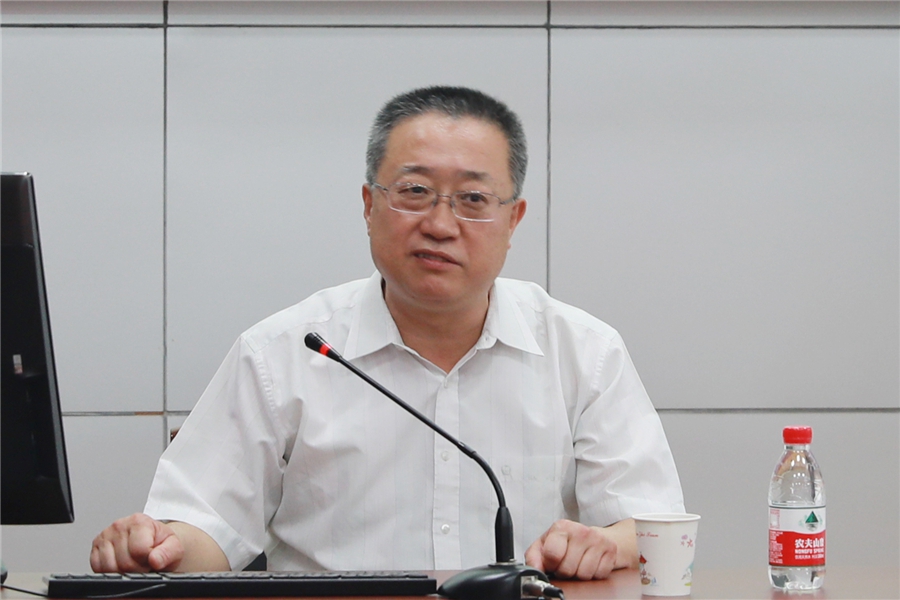Recently, Meng Qinglong, a researcher at the Institute of World History of the Chinese Academy of Social Sciences, and the team leader of one of the Major Projects of National Social Science Foundation in 2012, Collection and Study on the Declassified Documents Involved in Sino-Indian Border Issues of 5 Countries, China, UK, USA, India, Russia, came to Wuhan to do research along with more than 10 researchers from his team. Meng Qinglong delivered a talk on Sino-Indian Relations in a Century: Convergence of History and International Relations at Wuhan University China Institute of Boundary and Ocean Studies (CIBOS) on the morning of the 8th, upon invitation of Guan Peifeng, the team leader of the project named Collection and Study on Archives of Land Boundary Problems in China since Modern Times of Wu Han university. Teachers and students from the CIBOS, the Institute of International Studies (IIS), the School of Political Science and Public Administration, the School of Marxism of Wuhan University, and some teachers and students from Central China Normal University attended this academic seminar.

Researcher Meng sorted the history of Sino-Indian relations in the past 100 years into four phases: from the 1920s to early 1950s, mutual understanding and supporting phase during the Chinese revolution ; from the mid-1950s to the 1970s, China-India moved from the honeymoon to the stages of divergence, conflict, and even war; from the 1980s to the end of the 20th century, the phase featured with the easing, normalization, and peaceful development of Sino-India relations; the fourth phase from the end of the 20th century to the present. Researcher Meng emphasized in particular the appreciation and encouragement of the leaders of the National Congress Party such as Nehru to the Chinese revolution in the 1920s. After Japan attacked China in an all-round way, Nehru, Gandhi and the Indian people gave "brotherly help" to China in moral, medical and other aspects to fight the Anti-Japanese War. During this period, China-India relations were "a real friend in need". After the founding of the People's Republic of China, India recognized it immediately and provided great help for China to play an active role in international arena. However, with the increase of China's international influence and the gradually emerging of the differences between China and India on Tibet issues and border issues, the mentality of Nehru himself and the Indian government on China became complicated. The conflicts between China and India have been constantly emerging, increasing and eventually led these two countries into war, and they have been in a state of opposition for a long time afterwards. Until December 1988, Gandhi's first visit to China as the Prime Minister of India, 34 years after his grandfather, Nehru, was known as the "ice-breaking journey", marking the end of the rivalry between China and India since 1962 and the beginning of a new good-neighborly relationship. In the 1990s, during the meeting between the leaders of China and India, the Agreement on the Maintenance of Peace and Tranquility along the Line of Actual Control in the India-China Border Areas and the Agreement Between the Government of the Republic of India and the Government of the People's Republic of China on Confidence-Building Measures in the Military Field Along the Line of Actual Control in the India-China Border Areas were signed.

(Meng Qinglong)
Meng Qinglong highlighted that since the end of the 20th century, India's attitude and policy towards China completed the transition from “debugging to adjusting”. In the new century, with the rise of China and Asia, China and India should strive to develop strategic cooperation partnership and eliminate differences. Although India still held “chips” such as “border issues”, “Tibet issues”, “Taiwan issues” and “extraterritorial factors” in its hands, taking into account the domestic situation and international environment that China and India are facing, the effect of these “chips” were declining. At this stage, with maturity of China-India relations and reduction of romantic factors between two countries, pragmatic cooperation continues to deepen. Not long ago, Chinese and Indian leaders had an historic informal meeting in Wuhan. Keeping frequent high-level strategic meeting between the two countries would help improve mutual understanding and deepen cooperation, which is in line with the common interests of the two countries and of the development and prosperity of Asia.
During discussion session, Meng Qinglong exchanged his opinions with teachers and students present in regard with issues such as ameliorated U.S.-India relations, the trend of India's international status, the possibility for Narendra Modi to stay in power for the long term, the trend of relationships among China, Russia an India, and the cooperation and divergence between China and India involved in Indian Ocean.
(Rewritten by Jin Yu)
(Edited by Fu Shanshan)
